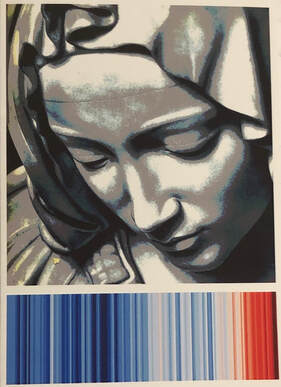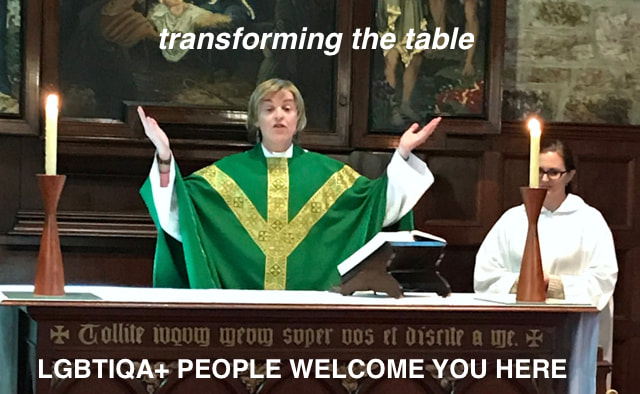|
Now this is my kind of Anglican Church - they did say they were ‘inclusive’ on the board but they hardly need to do so with all that gorgeous colour and creativity! Lol These are glimpses of the Festival of Angels in St Wulfram’s Grantham - none of your obvious over-frail tiny frilly fluffy angels either, but each with their own symbolism, including the one with flaming sword, the very posy one with the long wings, and the imposing tall white fluffy one at the door.
Now there’s an idea for some of us to develop in other contexts in other years?
0 Comments
a reflection on the journey to genuine 'inclusion' for the Diversity & Inclusion Council of Uniting NSW/ACT
Thank you so much for the opportunity of sharing with you today. Let me first acknowledge the Gadigal peoples of the land from which I speak, and their elders past, present and emerging. I would also like to express my thanks for the work Uniting is already doing in terms of diversity and inclusion, including the vital encouragement this is to myself personally. For genuine visibility of our human diversity is so critical and enriching, as I know from my own experience and the huge number of people who contact me, from all kinds of places. joyfully receiving gifts One of the things I have learned from First Nations peoples is the importance of genuineness of spirit and intent. Back in 1986 in Alice Springs, Pope John Paul II put this well in sharing with Aboriginal and Torres Strait Islander peoples. ‘Until your gifts have been offered’, he said, ‘and joyfully received, the Church in Australia will not be that which Jesus Christ wants to see.’ That challenging truth remains central not only to the Church, but to all parts of Australian life. Until First Nations’ gifts have been fully offered, and joyfully received, with justice, then we will never be the country we can be. That must be the underlying theme of all we do in terms of diversity and inclusion. Yet those words apply more broadly, don’t they? Until the gifts of Asian, Pacific Islander, Middle Eastern, African, LGBTQ+ people, and all kinds of Australians have been offered, and – crucially - ‘joyfully received’, then we will not be what we can be. ‘Joyfully’ is a key adjective. What spirit and intent do we really have? If we approach inclusion mainly as an obligation (politically correct or otherwise), we will have missed the point. For one thing, anyone feels more likely to offer their gifts if there is likely to be a joyful reception. We will never maximise the capacity of any organisation, whether a church, a nation, or Uniting, if we do not joyfully embrace the gifts we are offered. What an opportunity we have as we emerge from, hopefully, the worst of what COVID-19 has done to expose the divisions and distinctions of wealth and power among us in Australia! To build back best, fully, and joyfully, enabling diversity and inclusion is vital. The character of our intent and its spirit is crucial. weak inclusion - as a noun In my experience, ‘inclusion’ can be a very weasel word, covering many continuing sins and PR appearances. Organisations have at least three approaches. The first is what I would call ‘weak’ inclusion. It is better than obvious exclusion but essentially about degrees of permission to belong. It is like a noun: it is somewhat fixed, concerned with quotas and boundaries, but really still involving social distancing rather than engagement. At times and in places, the Uniting Church exercises this kind of inclusion. You can belong as a minority, but are you really honoured, engaged, and joyfully received? That too is where many First Nations people were in Anglican circles in Southern Queensland, including in Anglicare, until we began our Reconciliation Action Plan a few years ago. medium inclusion - as an adjective Secondly, there are ‘medium’ approaches to inclusion. This is what I have experienced in moving into Uniting Church ministry. It involves a genuine welcome, with some affirmation, openness to involvement, and certainly much kindness. Whereas ‘weak’ inclusion is mainly being allowed to the table, this might even include being at the head of the table. Other than Anglo ethnicities, and LGTBQ+ and other networks are also taken with some seriousness. Inclusion becomes more like an adjective than a noun – it is about being inclusive, more dynamic than simply inclusion. It is where the Reconciliation Action Plan was in the Anglican Church Southern Queensland when I left, and maybe, where Uniting is right now. It is, however, only a happier, but not yet fully joyful stage. strong inclusion - as a verb A third stage of inclusion has a deeper spirit and intent. This ’strong’ stage is not about even genuine welcome, but about revealing the gifts of all. It includes affirmation but is really about celebration, led by everyone in our diversity when we are all truly empowered. It is about inclusion as a verb: about active practice day by day; including like Uniting, as a dynamic community of living and belonging. It is also wonderful for any organisation. For we no longer have to work hard at showing we are diverse and inclusive. We demonstrably are. It is our very DNA. Others see it, which also saves many promotional expenses! The Uniting Church aspires to this, and at times manages it. The most visible sign is the Covenant with Uniting Aboriginal & Islander Congress - although, even there, questions remain, including about resourcing and how voices are actually heard and make a difference. Yet the Uniting Church as a whole is not there yet. I sense however that Uniting can move into at least some kind of ‘stronger’ inclusion, where all levels of staff and operations see it as their own work. That is another major shift, but ultimately, as it becomes more natural, it in fact requires less work from advocates and leadership than ‘weak’ and ‘medium’ inclusion – for it belongs to everyone, when everyone truly belongs. True including thus also leads on to expansiveness. sea-change We live in the tag end of some frankly rubbish times, when the very dignity of some human beings has been under question. We have major policies of exclusion in Australia, including towards First Nations claims for justice, towards refugees, some migrants and the poor. Currently, we also have hurtful bills of religious discrimination in federal and state parliaments. Yet my belief is that these are rotten but passing times. I see the journey towards Australian diversity and inclusion as like a sea-change. The waves come in at different speeds. Sometimes they rise high: as with the 1967 Referendum, the Apology to the Stolen Generations, Marriage Equality, and so forth. At times they fade away and we think the tide has gone. Yet it will assuredly return. The key thing is to hold faith and make ready for the next big wave of Australian diversity and inclusion. It will come, and those who are prepared can surf it. Others who do not prepare will flounder. For there is, let’s face it, no vibrant and really sustainable future for Australia without renewing our multicultural identity. Uniting is well placed to seize that time when it comes, if it continues to move more deeply into diversity and inclusion. So, May God bless us all in this exciting journey! I've been troubled lately by 'inclusive' churches saying 'LGBTIQA+ are welcome here'. Such words involve good intentions but embody the problem they seek to address. For let's think about it. Do we say 'heterosexual/cisgender people are welcome here'? Or, even when we aim to tackle enduring sexism and racism, do we say 'women are welcome here', or 'black people are welcome here'? Now thankfully this is a step beyond 'all welcome here' - that now trite phrase on so many noticeboards and church communications. Like the offensive phrase All Lives Matter, 'all welcome' tends not only to erase our vibrant differences, but pays no attention to our particular experiences of power and (degrees of) acceptance. 'LGBTIQA+ are welcome here' is also better than 'we welcome LGBTIQA+ people here', which much more starkly represents the issue: differentiating 'we' - i.e those at the heart of the church community - from 'them', the sexually and gender diverse 'outsiders'. Yet it too also reflects the dominant approach of relating to sexually and gender diverse people as 'Other'. It fails to speak of the agency of LGBTIQA+ people our/themselves. It still keeps us/them in the status of guests, more or less unwelcome. It does not grasp that sexually and gender diverse people are as much the hosts and gifts of God's love as anyone else. Perhaps it is even time to leave 'affirmation' behind, and speak more directly of celebration and transformation? After all, sexually and gender diverse people are as much hosts as guests in Jesus' 'radical hospitality'...
 On this New Year's Eve, 4 000 people took refuge from bushfires on the beach at Mallacoota in Victoria. The dramatic pictures - full of burning, smoke, and red skies - understandably drew forth words such as 'apocalyptic'. With two more lives lost today, together with many houses, the unprecedented series of bushfires across Australia cast a strong pall over the nation. The evacuation on the beach is but one powerful symbol, but, in the apocalyptic mood, it vividly makes fact the fiction of the famous film On the Beach (released in 1959, starring Gregory Peck, Ava Gardner and Fred Astaire), with its Melbourne 'end of the world' scenes. This is not the product of nuclear devastation however, but of the wilful neglect of decades of climate research and the 'she'll be right' blinkered stubborness of so much Australian and worldwide 'leadership'. It is a fierce verdict on such self-obsessed, and ultimately self-destructive, politics which have been so prominent in so much of the world this year. At the turn of this year therefore, lament, rather than looking forward, may seem most appropriate. What hope do we find?...  Laying the foundations of a labyrinth at St Luke’s has been a beautiful symbol of our parish journey together. For we are named after someone – St Luke – who wrote the Gospel of Luke and the Acts of the Apostles to encourage us to see our life and faith as a journey into the heart of God and a journey into deeper relationship with all those around us. Like the first disciples on the Emmaus Road, we are called to experience God in Jesus Christ as we travel with our parish vision: to be more deeply ‘focused in Christ, joyful and inclusive, compassionate in witness’. Over the last few months we have been praying and reflecting together about the next steps we should take. It has been a very positive experience. For we have begun to discover new pathways building on our current strengths and shared Christian traditions. We have identified a MAP (short for Mission Action Plan) which we hope and trust will help us walk forward together over the next 3 years. Unlike the final stage of the labyrinth, it will not be fixed in stone. Some things will work. Some things will not. Other surprises will come our way. Yet our MAP will help us from straying from the pathway, helping us better attention to God’s love among us. in both our inward and outward looking journeys. There are six aspects to our MAP, like the six petals at the centre of our labyrinth. By far the highest priority identified by members of the parish is developing our ministry with younger people, children & families (including seeking a new paid member of staff to guide and support us). Alongside this is a second priority of engaging with the new Pilgrim course – for existing and new members of our parish to grow as Christians. Thirdly, we particularly seek to develop a growing sense of the St Luke’s site as a, cathedral like, Minster for our city: as an accessible place of prayer for all (‘focused in Christ’), an open meeting place for people of different backgrounds (‘joyful and inclusive’), and a lively place to explore and bring together ancient and contemporary understandings of life, truth, justice and beauty (‘compassionate in witness’) – ‘in the heart of the City, in the heart of God’. May God bless us therefore as travel on. |
AuthorJo Inkpin is an Anglican priest serving as Minister of Pitt St Uniting Church in Sydney, a trans woman, theologian & justice activist. These are some of my reflections on life, spirit, and the search for peace, justice & sustainable creation. Archives
July 2024
Categories
All
|

 RSS Feed
RSS Feed